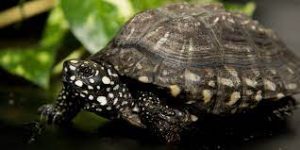Kaziranga National Park : Mahouts Arrested For Capturing Spotted Pond Turtles

Three persons engaged as mahouts (keepers and drivers of an elephant) in the Kaziranga National Park and Tiger Reserve, Assam, have been arrested for capturing and consuming spotted pond turtles, a rare species of a freshwater turtle.
- The incident has raised concerns about the illegal consumption of protected species by park employees, leading to investigations and arrests.
- Spotted pond turtles( Geoclemys hamiltonii) are named for the yellow or white spots on their black heads, legs and tails.
- They have large heads and short snouts, and their webbed feet help them swim.
- They are also known as Black Pond Turtle, Black Spotted Turtle, Hamilton’s Terrapin.
- They bask in the sun to regulate their body temperature. Their need for warm water and an intense basking area is important.
- They are found in large, deep rivers in India, Assam, Pakistan and Bangladesh.
- In India, the species is distributed across the north, northeast and a few parts of central India
- These turtles are primarily carnivorous and eat aquatic invertebrates.
- Spotted pond turtles are crepuscular, meaning they are most active at twilight (dusk and dawn).
- Conservation Status:
- International Union for Conservation of Nature (IUCN) : Endangered
- CITES : Appendix I
Kaziranga National Park:
- It is in the State of Assam and covers 42,996 Hectare (ha). It is the single largest undisturbed and representative area in the Brahmaputra Valley floodplain.
- It was declared as a National Park in 1974.
- It has been declared a tiger reserve since 2007. It has a total tiger reserve area of 1,030 sq km with a core area of 430 sq. km.
- It was declared a UNESCO World Heritage Site in 1985.
- It is recognized as an Important Bird Area by BirdLife International.
- It is the home of the world’s most one-horned rhinos. Pobitora Wildlife Sanctuary has the highest density of one-horned rhinos in the world and second highest number of Rhinos in Assam after Kaziranga National Park.
- Much of the focus of conservation efforts in Kaziranga are focused on the ‘big four’ species— Rhino, Elephant, Royal Bengal tiger and Asiatic water buffalo.




